by Kristin Distel
Alum Pam Groen and student Madeline Groen have always shared an interest in biology, animals and laboratory science—as well as a longstanding love for Ohio University.
They are mother and daughter, and their mutual dedication to Biological Sciences has led them to pursue careers that serve others while also allowing them to chase their passion for science.
“I’d often pick up Madeline from day care, bring her to the lab so I could continue to work, and let her look at slides under a microscope,” Pam says. “As a child, Madeline even learned how to dissect an eye! I took organs out of jars and showed her how a heart works. She was never disgusted or intimidated; she was curious. The more I could show and teach her, the better,” she adds.
“We had so much fun doing science that I didn’t realize how hard it was,” Madeline remarks. “I was exposed to science growing up and understood that I could make a career out of it!”
Pam Groen majored in Biological Science, pre-med, and Chemistry with a Mathematics minor, while Madeline majors in Wildlife & Conservation Biology as well as Sociology.
A Remarkable Career
Pam is currently employed as a private consultant. She works “in the field of the business of science through complete laboratory design and implementation.” She is a remarkably successful and accomplished alum.
Pam is the author of 36 journal articles, 12 of which made the cover of their respective publications. Additionally, she built an international biology tissue repository, the only psychotropic collection in the world.
- Connect with Pam Groen on LinkedIn or via her website The Business of Science.
She also has worked to secure medical patents for pediatric care, which have drastically reduced global death rates and become the standard of care for people who receive transplants.
“I have done research through to clinical treatment,” Pam explains. “It’s an approach that takes me from the bench to bedside.”
Pam’s extensive list of successes includes employment with Assurex Health, where she was employed as Senior Director of Laboratory Operations. At Assurex Health, she also worked in pharmacogenomics, which familiarizes patients who are receiving mental health treatment with the different medical options available to them.
As Senior Director, Pam also helped prepare the laboratory to be sold—a $410,000,000 sale.
“This job allowed me to work in healthcare and privatized science while directly impacting the business financials, the profits of which were in the millions,” she explains.
‘A Direct Impact on Patient Care’
Her work has also allowed her to assist with extraordinary developments in cancer research.
“I was instrumental in bringing multiple new tests from the newest technology to market,” she states. “This technology has directly impacted how adult cancer is treated. We personalized cancer care and researched how gene markers interact with cancer treatments. This is personalized medicine at its core. I got this technology up and running at OSU for the James Cancer Center. This has had a direct effect on patient care.”
Pam has also built multiple laboratories, is a hospital inspector specializing in molecular science, won national awards for contributions to medicine, and brings all of this to bear in her work as a private consultant.
“Labs drive businesses,” Pam explains. “If you don’t have a strong, functional lab, you nothing to provide to the patient. When it comes to designing, scaling, and budgeting, I’m involved in all cogs of the wheel. This involves clear, efficient communication with physicians, clients, patients, and investors”
Pam’s Foundation at OHIO
Pam recalls her time at OHIO as fun, memorable, and foundational to her personal and professional life. She even met her husband at OHIO; Lou Groen ’93 majored in communications.
“He’s incredibly supportive of my career,” Pam notes. “He helps ground Madeline and me.”
She notes that her first real experience with laboratory work occurred at OHIO, during a randomly assigned work-study job.
“I scraped disgusting agar out of petri dishes and completed other, similar tasks. This gave me exposure to a real lab, versus working in a cafeteria, for example. It was a springboard to my current work and really built a nice foundation,” Pam remarks.
She has carried this work ethic with her throughout her career, always remembering that each job and every person in a laboratory is important.
“Through all my lab jobs, I still washed dishes. It’s important to stay in the middle, to talk to everyone, to learn about the working parts in each lab,” Pam remarks. “I’ll carry this with me for the rest of my life. I call it water therapy!”
Even though Pam honed her strong work ethic in OHIO’s labs, she also made time to enjoy the unique experiences that Athens provides. She recalls the friendships and close-knit Athens community that she enjoyed as a student.
“I always describe OHIO as having the feel of a large summer camp. Students get the benefit of camaraderie, but without a big city,” Pam explains.
Madeline ‘Not Just Another Number’ at OHIO
Like her mother, sophomore Madeline Groen has found her niche in Athens and at OHIO, particularly in her science courses. In fact, Pam and Madeline took biology from the same professor, Dr. Scott Moody.
With the help of dedicated professors, Madeline especially established herself in her sophomore year as a committed, standout student.
“I took chemistry with Dr. Corey Beck, and he was so helpful,” Madeline says. “He really walked me through chemistry. I attended every one of his office hours. We went over my work and exams together, and he was so reassuring. I was not just another number.”
Madeline’s mother also helped her navigate the waters of being a biology student.
“She helped me choose my current lab position,” Madeline states. “I had no idea how to obtain work in a lab, but Mom suggested that I should talk to my adviser. She has helped me figure out who to talk to and what to do.”
Madeline has also joined TriBeta, OHIO’s biological sciences honor society.
“TriBeta has completely changed my college experience,” she says. “I’ve made so many friends through the society! Plus,” she adds, “the size of OHIO is perfect. I’ve never felt unsafe, and everyone is welcoming. There’s always something to do.”
Exposure to Lab Work, Helping Animals
Madeline also notes that her love for animals helped shape her decision to study biological sciences.
For 10 years she showed animals as a member of 4-H, and as a child, she went to the zoo almost every week, even in the dead of winter. Pam’s first job was at a zoo, and Madeline’s experience of visiting the animals there proved formative.
“I grew up wanting to have contact with animals, and to help them in some way,” Madeline notes. “We now have a family farm, which helps me understand animals and their needs.”
Madeline notes that she is also interested in the sociology of animal behavior. “I want to be able to understand both people and animals,” she says. “I’m interested in animals’ environments and how to enrich those environments and animals’ lives.”
After graduation, Madeline hopes to work as a field biologist at a zoo, which would allow her to travel while observing and researching animals’ sociology and interactions firsthand.
“Essentially,” she says, “I would be paid to travel, work with animals, and study their behavior.”
Fortunately, Madeline has already had significant experience in this area. While in high school, she visited the Florida Keys as part of a marine biology research project. Additionally, in summer 2017, she traveled to Cambodia, where she spent two weeks observing elephants that had been rescued from illegal logging and riding operations.
“It was an absolutely incredible experience,” she says. “The elephants live on 25,000 acres of land. They were so beautiful; I just stood in front of them and cried. My work in Cambodia really cemented what I want to do with my life.”
Early Lessons in the Life of a Biologist
From watching her mother, Madeline learned how much dedication a career in biology requires.
“I tried to teach her from a young age that to be successful in this career, you have a good work ethic. It’s a lifestyle, not a job. This profession dominates one’s life,” Pam remarks.
Part of this entrenchment in the life of a biologist included time spent in laboratories. In conjunction with Madeline’s work in Cambodia, growing up watching her mother at work was the driving force behind her decision to pursue a career in biological sciences.


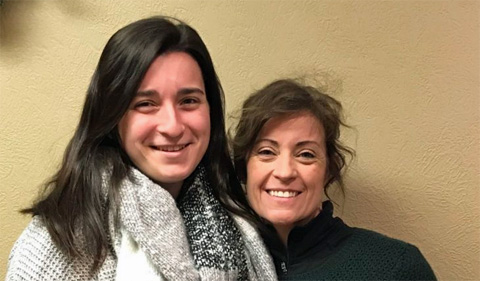
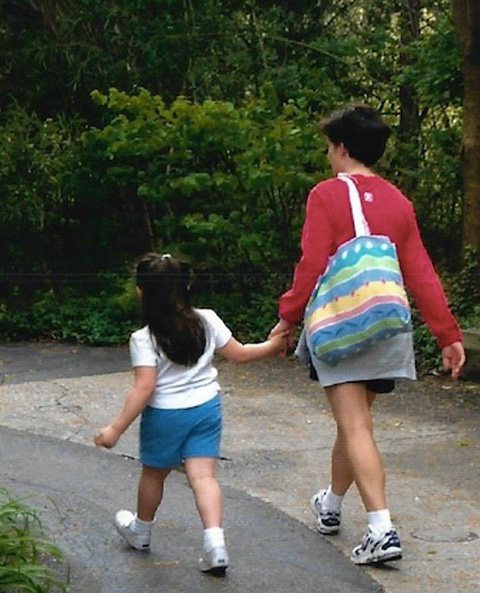
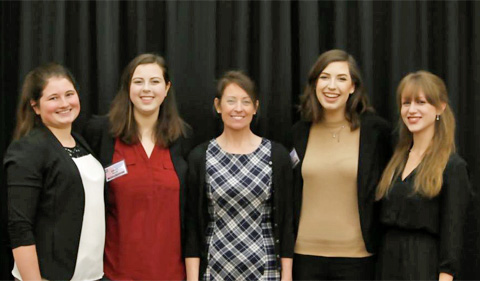
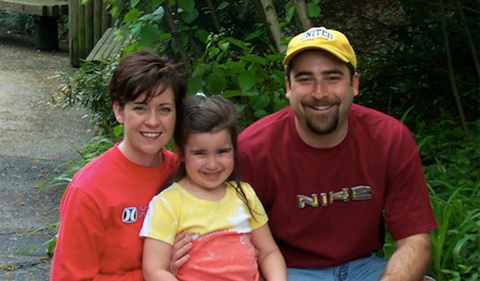
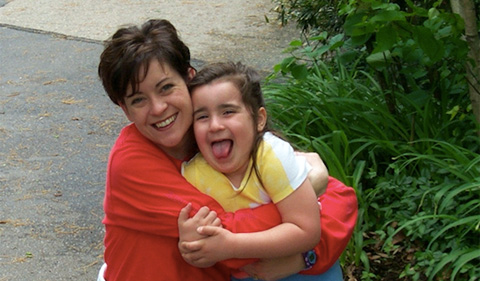

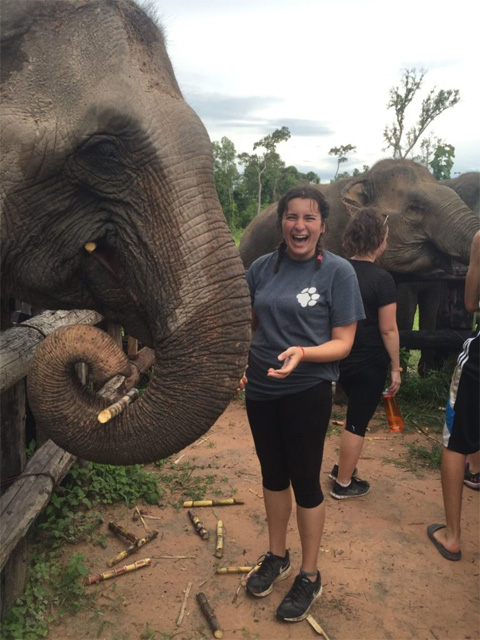

















One Comment